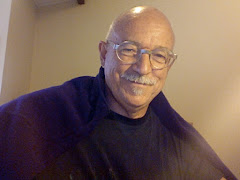"Religious Resources in Resignifications of Queer Identity: The Case of Christopher Isherwood, 'homosexualist' and disobedient subject."
For British critics, Christopher Isherwood went off the literary radar when he declared himself a pacifist and de-camped to California on the eve of WWII. Nothing he wrote after the "Berlin Stories" (1939), when his life was barely half over, until "Christopher and His Kind", in 1976, when he emerged as a kind of gay literary icon, was accorded much serious attention from Britain’s literary establishment.
Furthermore, what he published during his long relationship with a guru in the Ramakrishna Vedanta tradition, which culminated in the classic "My Guru and His Disciple" (1980, published when he was 75), has scarcely been taken seriously, and few literary critics have detected the influence of Vedanta in his later work (e.g. Nagarajan 1972). Yet there have been calls for Isherwood to be re-evaluated as a serious religious writer (Wade 2001).
If such calls are to be taken seriously there are several issues that need to be addressed, not the least of which would be the dominant cultural expectations surrounding the (im)possibility of a spirituality not predicated on the denial of (a non-conformist) sexuality. "My personal approach to Vedanta was, among other things, the approach of a homosexual looking for a religion which will accept him", he wrote in 1970. This panel will interrogate several of the issues contributing to the occlusion of his religious life and writing.
In addition to the pathologizing discourse of psychological medicine that promulgated a construction of "homosexuality" as developmental failure, for example, there is also the problem of an unreconstructed colonialist prejudice towards religious practices associated with a subject people. For a lapsed Anglican atheist and former socialist to take on a guru and investigate Vedanta was unacceptable in 1939, and contributed to the feeling in Britain that he was, once again, "letting down the side". For his best friend, W.H. Auden, all this "heathen mumbo jumbo" was really beyond the pale. Isherwood was seeking out not only a rationale for his new-found pacifism, but a differently ordered array of "technologies of the self" than those provided by the Anglicanism of his upbringing. In Vedanta he found useful transformational tools among an otherwise "subjugated knowledge" system (to borrow Foucault’s terminology) that allowed him to move beyond the boundaries of his culturally ordained subject positioning.
His persistence with the practices of the Ramakrishna Vedanta tradition while continuing as an unrepentant "homosexualist" (Savage, 1979), is an instance of what Judith Butler would describe as a moment "in which the subject exceeds the terms that constitute him/her", a staging of "unforeseen and unsanctioned modes of identity" (Salih, 10).
The panel will address the role of auto/biographical praxis in resignifications of "queer" identity, drawing not only on Butler, but also on feminist theorists of life writing such as Sidonie Smith and Julia Watson (1996), who say that in specific situations, people may "choose not to narrate the stories that are prescribed for them", opting instead to "reframe the present by bringing it into a new alignment of meaning with the past" (12). Writing autobiographically becomes a resistant strategy for re-narrativizing the self, an assertive recontextualization that recovers meaning from the toxic narratives buried within hostile discourses. The "subject" changes place — from being a product of a discourse of subjugation into an assertive agent of self-signification. (One panelist will trace the roots of the genre of "queer spiritual autobiography" back to Whitman and Carpenter in the 19th Century.)
The panel will analyze how his investigation and embrace of Vedanta philosophy and practice confronts the standard views of what is possible for a "gay" man to know. For, by withholding from non-conformists the possibility of an engagement with "the divine", certain strands within conventional Western religious discourse produce what Foucault calls "regimes of truth" — power/knowledge relations that constitute "a set of rules by which truth is produced". In his personal search and his textual interrogation of notions of what constitutes a "self", Isherwood produced versions of subjective identification that disrupted authorized views of masculinity, and confronted the exclusivist modeling of the religious life as it was framed discursively within his own historical and cultural context. One panelist will interrogate modernist constructions common to the period, including the notion that “the homosexual” subject was an identity understood to signify developmental “failure”, in order to mark its difference from a presumably fully-developed, mature “heterosexual” being.
The discussion will draw upon Peter Berger's analysis of the functioning of "plausibility structures" in the sociology of knowledge systems, and the mechanisms by which different sources of knowledge and information are accorded "differential plausibility", with "deviant" views marginalized or excluded. "The threat to the social definitions of reality" writes Berger, with Thomas Luckmann, is neutralized by "assigning an inferior ontological status, and thereby a not-to-be-taken seriously cognitive status, to all definitions existing outside the symbolic universe" (Berger & Luckmann 1966, 133). One panelist will address the prejudicial dichotomizing which casts Western religious practice within a reified "rationalist" discourse, opposed to Hindu beliefs and practices which it characterizes as "superstitious".
Isherwood was inclined less to approach ideas as abstract principles and more as they were embodied in particular people. In Swami Prabhavananda, an exponent of the Ramakrishna Vedanta tradition, Isherwood found a life-long guide, and the narrative of his spiritual journey is the history of a relationship that deepened over forty years. That bond, and the non-dualist elements of Advaita Vedanta that made it a hospitable environment for a former atheist and all-round dissident to explore his spirituality, will be another focus of this discussion.
Subscribe to:
Post Comments (Atom)














.jpg)








No comments:
Post a Comment